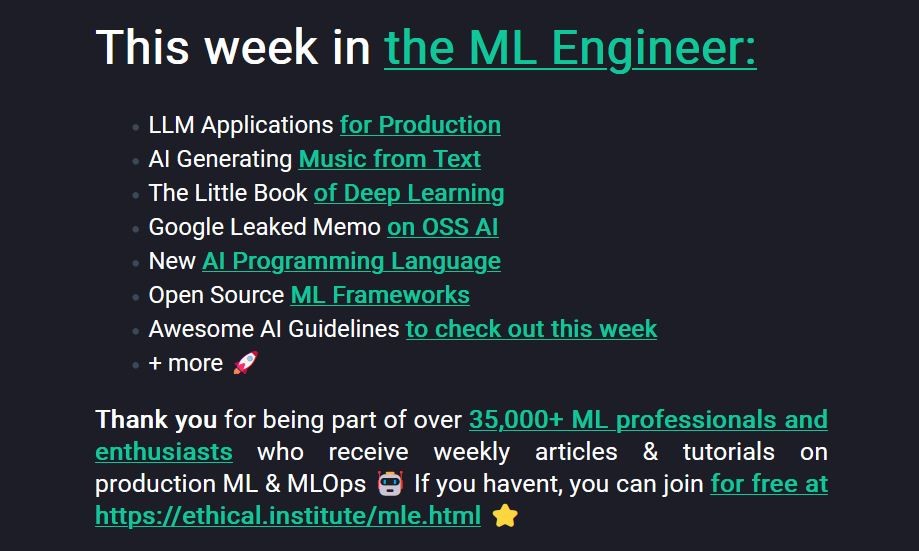
Issue #229 - THE ML ENGINEER ??
Alejandro Saucedo
Tech Executive @ Zalando | Chair/Advisor @ UN, EU, ACM, etc | Join 60k+ ML Newsletter
This 229 edition of the ML Engineer newsletter contains curated ML tutorials, OSS tools and AI events for our 30,000+?subscribers. You can access the Web Newsletter Homepage as well as the Linkedin Newsletter Homepage where you can find all previous editions ??
If you like the content please support the newsletter by sharing with your friends via ?? Twitter,??? Linkedin and??? Facebook!
This week in the ML Engineer:?
Thank you for being part of over 35,000+ ML professionals and enthusiasts who receive weekly articles & tutorials on production ML & MLOps ?? If you havent, you can join for free at https://ethical.institute/mle.html ?
If you would like to suggest articles, ideas, papers, libraries, jobs, events or provide feedback just send us an email to [email protected]! We have received a lot of great suggestions in the past, thank you very much for everyone's support!
Building LLM applications for production ?? A fantastic article by Chip Huyen discussing the challenges of building production-ready applications using large language models. This comprehensive and practical overview dives into prompt engineering techniques, as well as the composability of tasks and the use of agents, tools, and control flows for more complex applications. It is interesting to see that although there is not yet consensus on terminology, we are seeing fast evolution on core concepts. Finally, the article explores promising use cases for LLMs, such as AI assistants, chatbots, programming and gaming, and search and recommendation, among others.
Generating Music from Text with AI ?? The paper introduces MusicLM, a generative model that creates high-fidelity music from text descriptions which not only are impressive but have led to even more impressive practical applications. It utilizes AudioLM's multi-stage autoregressive modeling for generating music, while extending it to incorporate text conditioning. It outperforms previous systems in audio quality and adherence to text prompts. The authors also introduce MusicCaps, a dataset with 5.5k music-text pairs for evaluation, and discuss potential risks and future improvements related to music generation.
The Little Book of Deep Learning offers a concise introduction to deep learning techniques, covering foundational concepts, model components, and various applications ?? It addresses the challenges of training deep neural network architectures and presents solutions to overcome them. This accessible guide is essential for machine learning practitioners seeking to understand the fundamentals of deep learning and its role in the future of AI.
Google's leaked memo on Open Source AI ?? A leaked internal Google document reveals that the employee believes the company isn't positioned to win the AI race against open source AI projects given how it is outpacing closed-source approaches. The article argues that open-source models evolve at faster pace becoming more customizable, private, and capable, with rapid advancements in low-cost, scalable, and efficient solutions. The document highlights the importance of collaboration and learning from the open-source community, reevaluating Google's value proposition, and focusing on smaller, more agile models.
Mojo is a new programming language designed to bridge the gap between research and production by combining Python syntax with systems programming and metaprogramming features ?? Having authored the Vulkan Kompute framework I can see this bridging a very important gap across high level and compute-optimized languages referred here to as the "nth-[-domain]-world" problem. Developed by Modular, Mojo aims to simplify programming across the entire ML/AI stack and target accelerators and heterogeneous systems common in machine learning. Really keen to see how this develops together with other innovative languages such as JuliaLang, Jax, etc.
领英推荐
Upcoming MLOps Events
The MLOps ecosystem continues to grow at break-neck speeds, making it ever harder for us as practitioners to stay up to date with relevant developments. A fantsatic way to keep on-top of relevant resources is through the great community and events that the MLOps and Production ML ecosystem offers. This is the reason why we have started curating a list of upcoming events in the space, which are outlined below.
Check out our "MLOps Curriculum" from previous conferences:
Other relevant upcoming MLOps conferences:
Open Source MLOps Tools
Check out the fast-growing ecosystem of production ML tools & frameworks at the github repository which has reached over 10,000 ? github stars. We are currently looking for more libraries to add - if you know of any that are not listed, please let us know or feel free to add a PR. Four featured libraries in the GPU acceleration space are outlined below.
If you know of any open source and open community events that are not listed do give us a heads up so we can add them!
As AI systems become more prevalent in society, we face bigger and tougher societal challenges. We have seen a large number of resources that aim to takle these challenges in the form of AI Guidelines, Principles, Ethics Frameworks, etc, however there are so many resources it is hard to navigate. Because of this we started an Open Source initiative that aims to map the ecosystem to make it simpler to navigate. You can find multiple principles in the repo - some examples include the following:
If you know of any guidelines that are not in the "Awesome AI Guidelines" list, please do give us a heads up or feel free to add a pull request!
About us ? The Institute for Ethical AI & Machine Learning is a UK-based research centre that carries out world-class research into responsible machine learning.
data & AI
1 年Wow!!!!